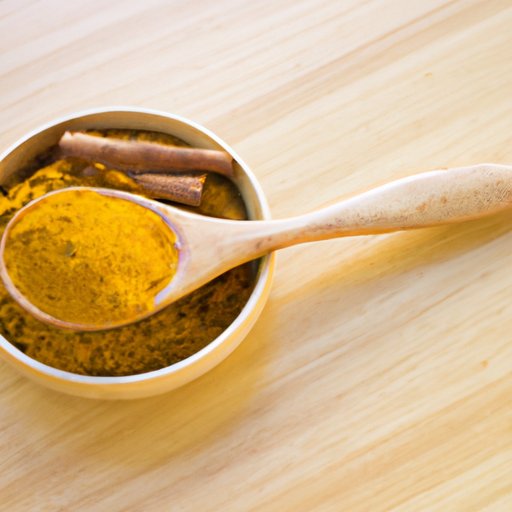Introduction
Curry is a type of dish native to South and Southeast Asia, typically consisting of a variety of spices, herbs, and other ingredients cooked in a sauce or gravy. Curry dishes can vary widely in terms of flavor and ingredients, but they are all generally characterized by their bold and flavorful mix of spices. While curry dishes are often associated with Indian cuisine, they are also popular throughout Southeast Asia, particularly in Thailand, Malaysia, and Indonesia.
Eating curry can be beneficial in terms of both taste and nutrition. However, there are also some potential risks associated with eating curry that should be taken into consideration. In this article, we’ll take a closer look at the health benefits and risks of eating curry, as well as provide tips for balancing flavor and nutrition when eating curry-based meals.

Health Benefits of Eating Curry: A Comprehensive Overview
The health benefits of eating curry depend largely on the ingredients used in the particular dish. Generally speaking, however, curry dishes tend to offer a wide range of vitamins and minerals, as well as healthy fats, proteins, and carbohydrates. Additionally, many of the spices and herbs used in curry dishes have been linked to various health benefits. Let’s take a closer look at the nutritional content of curry dishes and the variety of health benefits associated with eating curry.

Exploring the Nutritional Content of Curry Dishes
Curry dishes typically contain a variety of macronutrients, including proteins, carbohydrates, and fats. The exact balance of these macronutrients will vary depending on the ingredients used in the dish. For example, if the dish contains a lot of vegetables or legumes, it may be higher in carbohydrates. On the other hand, if the dish contains a lot of meat or fish, it may be higher in protein.
Curry dishes also typically contain a variety of micronutrients, such as vitamins, minerals, and antioxidants. Many of the spices and herbs used in curry dishes are rich in these micronutrients, which can help support overall health and wellbeing. For example, turmeric, one of the most common ingredients in curry dishes, is a powerful anti-inflammatory and antioxidant. Additionally, cumin, coriander, and cardamom are all commonly used in curry dishes and are linked to a variety of health benefits.
Investigating the Potential Health Risks Associated with Eating Curry
While curry dishes can offer a variety of health benefits, there are also some potential risks associated with eating curry. One of the main concerns is the spicy components of curry dishes. While the spices and herbs used in curry dishes can offer a variety of health benefits, they can also cause digestive issues in some people. Additionally, the fat content of some curry dishes can be high, which can lead to weight gain and other health issues if eaten in excess.
Balancing Flavor and Nutrition: An Analysis of Curry-Based Diets
When it comes to eating curry, it’s important to strike a balance between flavor and nutrition. To ensure that you’re getting the most out of your curry-based meals, it’s important to select healthy ingredients that offer both flavor and nutrition. For example, adding lean meats, legumes, and plenty of vegetables can help to increase the nutritional value of the dish while still providing a delicious flavor. Additionally, limiting the amount of added oils and fats can help keep the fat content of the dish under control.
It’s also important to remember that curry dishes do not need to be overly spicy in order to be flavorful. In fact, many curry dishes can be quite mild, yet still offer an array of flavors and textures. When selecting spices and herbs, it can be helpful to start with smaller amounts and gradually add more until you find the right balance of flavor and heat.

The Power of Spices: How Curry Enhances Health and Wellbeing
In addition to offering a variety of flavors and textures, the spices and herbs used in curry dishes can also enhance health and wellbeing. For example, many of the spices and herbs used in curry dishes have anti-inflammatory properties, which can help reduce inflammation in the body. Additionally, the antioxidants found in spices and herbs can help protect against oxidative stress and free radical damage.
Finally, the spices and herbs used in curry dishes can also help to boost digestion and absorption of nutrients. This is particularly true of spices like ginger and turmeric, which are known for their digestive-supporting properties.
Conclusion
Eating curry can be beneficial in terms of both taste and nutrition. Curry dishes offer a variety of vitamins, minerals, and other nutrients, as well as a wide range of health benefits associated with the spices and herbs used in the dish. However, there are also some potential risks associated with eating curry, such as digestive issues caused by the spicy components of the dish and the potential for weight gain due to the high fat content of some curry dishes.
To ensure that you’re getting the most out of your curry-based meals, it’s important to select healthy ingredients that offer both flavor and nutrition. Additionally, it’s important to remember that curry dishes do not need to be overly spicy in order to be flavorful. By striking a balance between flavor and nutrition, you can enjoy the health benefits of eating curry without compromising your taste buds.
Overall, eating curry can be a great way to add flavor and nutrition to your diet. With the right ingredients and preparation, you can enjoy the health benefits of eating curry without sacrificing taste.
(Note: Is this article not meeting your expectations? Do you have knowledge or insights to share? Unlock new opportunities and expand your reach by joining our authors team. Click Registration to join us and share your expertise with our readers.)
